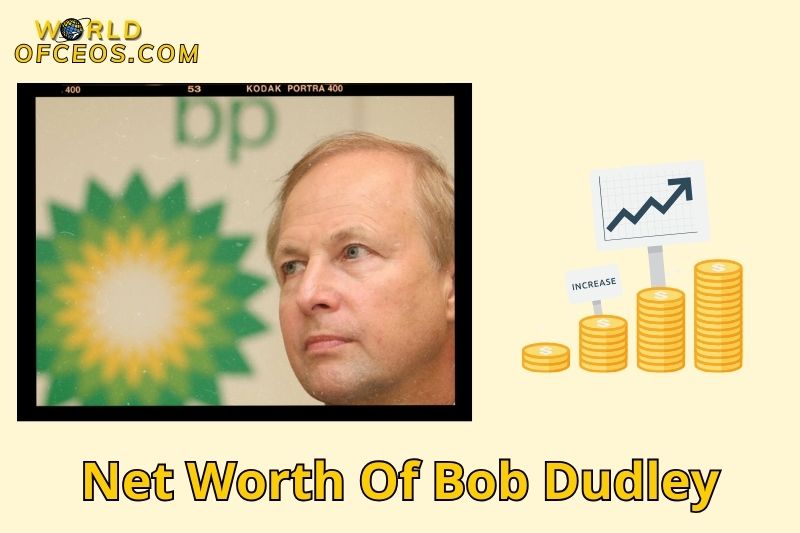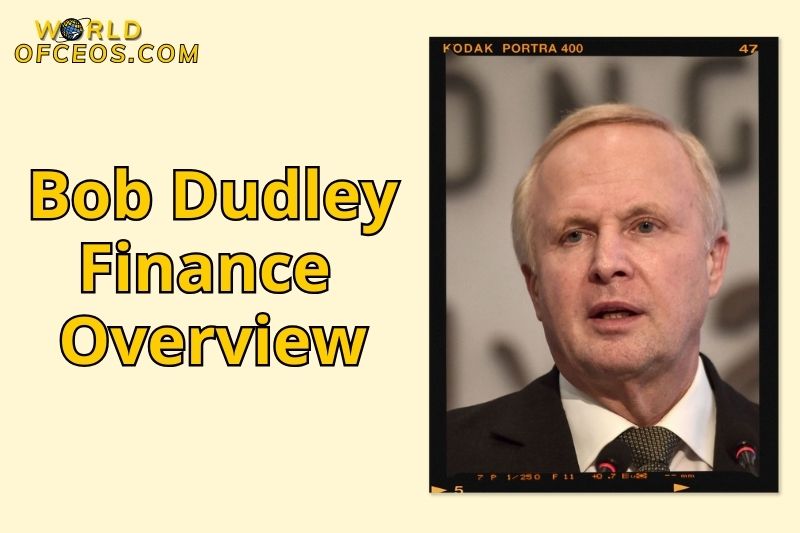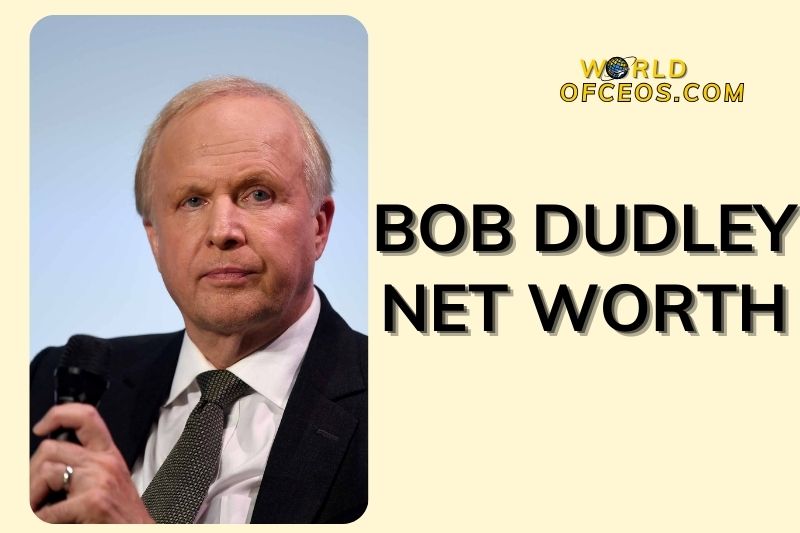Have you ever wondered about the net worth of former BP CEO Bob Dudley? At World of CEOs, we dive deep into the financial world of influential figures like Dudley.
From career highlights to wealth accumulation, get ready for an intriguing exploration of Dudley’s financial journey.
Quick Facts
| FACT | DETAIL |
|---|---|
| Real Name | Robert Warren Dudley |
| Popular Name | Bob Dudley |
| Gender | Male |
| Birth Date | September 14, 1955 |
| Age | 68 |
| Parents | N/A |
| Siblings | N/A |
| Birthplace | Queens, New York, USA |
| Nationality | American |
| Ethnicity | Caucasian |
| Education | University of Illinois, Thunderbird School of Global Management |
| Marital Status | Married |
| Sexual Orientation | Straight |
| Wife/Spouse | Mary Dudley |
| Children | N/A |
| Dating | N/A |
| Net Worth | $40 million – $50 million |
| Source of Wealth | Executive roles, Investments |
| Height | N/A |
What is the Net Worth Of Bob Dudley in 2024?

As of 2024, Bob Dudley’s net worth is estimated to be between $40 million and $50 million. This substantial wealth is primarily derived from his extensive and successful career in the energy sector, notably during his tenure as the CEO of BP.
For comparison, Tony Hayward, another former CEO of BP, has a net worth of approximately $40 million. These comparisons underscore Bob’s significant financial standing among his peers in the industry
What is the Salary/Income Of Bob Dudley in 2024?
In 2024, Bob Dudley‘s income is primarily derived from his role as a member of the Board of Directors at LyondellBasell Industries NV, where he earned $330,202 in total compensation.
This includes both cash payments and equity awards.
Additionally, Dudley receives income from his board memberships and investments in other ventures, such as his involvement with Axio Global and 8 Rivers Capital
Bob Dudley’s Finance Overview

Career at BP
Bob Dudley joined BP after its acquisition of Amoco and played various strategic roles. As CEO from 2010 to 2020, Dudley’s leadership was pivotal during the Deepwater Horizon oil spill.
His compensation included a substantial salary, bonuses, and stock options, reflecting his contributions to BP’s performance and crisis management.
His decisions had a profound impact on BP’s financial health.
For instance, during his tenure, BP’s recovery from the oil spill involved massive financial settlements and restructuring, which ultimately stabilized the company and restored investor confidence.
His compensation package was often a topic of interest, especially during shareholder meetings where his high earnings were scrutinized.
Financial Impact of TNK-BP Joint Venture
Dudley’s role as President and CEO of TNK-BP from 2003 to 2008 significantly boosted his financial profile. Under his leadership, the joint venture’s oil output increased by a third, reaching 1.6 million barrels per day.
This performance led to substantial earnings for Dudley, although his tenure was marred by disputes with the Russian partners, AAR.
These conflicts eventually forced Dudley to leave Russia, but his strategic management during this period was financially rewarding.
Role in Gulf Coast Restoration Organization
In 2010, he was appointed to lead BP’s Gulf Coast Restoration Organization, overseeing the response to the Deepwater Horizon oil spill. His compensation for this critical role included significant bonuses and financial rewards.
Managing this crisis involved coordinating cleanup efforts, liaising with government authorities, and communicating with the public about BP’s actions.
Dudley’s financial compensation for this role was reflective of the immense responsibility and pressure associated with the position.
Involvement with Rosneft
Dudley joined the board of Rosneft, the Russian state-owned energy giant, in 2013. His role at Rosneft contributed significantly to his wealth.
As a board member, he earned substantial fees and participated in strategic decisions impacting the company’s direction.
His resignation from Rosneft in 2022, amid geopolitical tensions, marked the end of a financially lucrative association with the company.
Post-Retirement Ventures and Investments
After retiring from BP in 2020, Dudley continued to expand his financial portfolio. He joined Axio Global as chairman in 2021, where he also participated in a $23 million Series B financing round led by Temasek’s ISTARI.
In 2022, Dudley joined the board of 8 Rivers Capital, further enhancing his income through board fees and investment returns.
FAQs about Bob Dudley

What is Bob Dudley’s Background?
Bob Dudley, born in 1955, is a prominent American businessman in the energy sector. He was the CEO of BP from 2010 to 2020.
His career at BP and Amoco spanned over 40 years, covering various roles in engineering and strategic planning across multiple regions.
What were Bob Dudley’s Major Achievements at BP?
Dudley played a crucial role in BP’s recovery from the Deepwater Horizon oil spill in 2010. He led efforts to stabilize the company and focus on environmental restoration.
Under his leadership, BP also advanced its transition to cleaner energy, emphasizing reduced emissions.
What Roles has Bob Dudley Held Outside of BP?
After retiring from BP, Dudley continued his influence in the energy sector. He chairs the Oil and Gas Climate Initiative (OGCI) and serves on the boards of Freeport-McMoRan and LyondellBasell.
He also contributes to 8 Rivers Capital, focusing on net-zero solutions.
How Did Dudley Handle the Deepwater Horizon Crisis?
Dudley led BP’s Gulf Coast Restoration Organization post-Deepwater Horizon disaster. His strategic and calm leadership helped BP recover and restore.
His efforts were pivotal in effective crisis management and environmental restoration.
What is the Oil and Gas Climate Initiative (OGCI)?
OGCI, chaired by Dudley since 2016, includes major oil and gas companies aiming to reduce greenhouse gas emissions.
The initiative supports the Paris Agreement and has a $1 billion fund for cleaner energy technologies.
What Educational Qualifications Does Bob Dudley Have?
He holds a bachelor’s degree in chemical engineering from the University of Illinois, an MBA from Southern Methodist University, and a Master of International Management from the Thunderbird School of Global Management.
What are Some of Dudley’s Views on Climate Change and Energy?
Dudley emphasizes industry collaboration to tackle climate change. He supports investments in natural gas, carbon capture, and hydrogen to balance energy needs with emission reductions.
He believes in credible actions to build public trust in the industry’s climate efforts.
What Challenges Did Dudley Face During His Career?
Dudley encountered significant challenges, including geopolitical issues like his expulsion from Russia in 2008 while leading TNK-BP.
Despite these, he focused on strategic growth and crisis management, earning respect in the industry.
What is Dudley’s Approach to Leadership?
Dudley advocates for calm, optimism, and providing hope during crises. He stresses the importance of consistent communication and having a plan, even if imperfect.
His leadership style is marked by resilience, strategic thinking, and collaboration.
What Honors and Recognitions has Bob Dudley Received?
In 2018, Dudley was named Petroleum Executive of the Year by Energy Intelligence. His leadership at BP and advocacy for sustainable energy practices have been widely recognized.
Conclusion
Bob Dudley’s wealth story is more than just numbers; it’s about understanding the journey of one of the top billionaires today.
Reflecting on his career, we see a blend of strategic decisions and opportunities that shaped his fortune. For more insights, visit us at worldofceos.com and discover the fiscal paths of leading CEOs.

